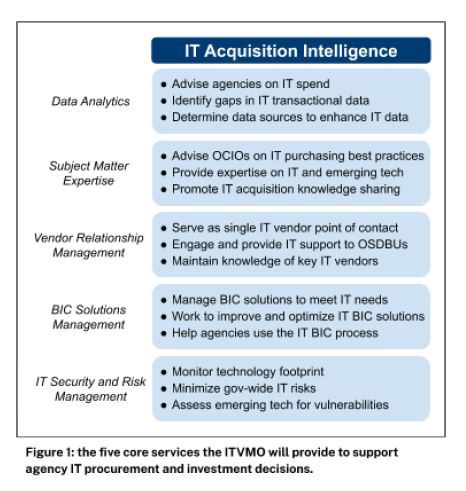
First Look
Launch of IT vendor management office part of next phase of category management
The Office of Federal Procurement Policy, GSA, NASA and NITAAC are working together to launch a new office in October that will use acquisition intelligence to help...
It’s been more than a year since the General Services Administration first floated the idea of a governmentwide contract for cloud and collaboration services, similar to the one the Defense Department awarded last August to General Dynamics IT.
While the Civilian Enterprise Office Solutions (CEOS) concept hasn’t gotten past the idea stage, the research behind it birthed another idea.
As an aside, the DoD version, called the Defense Enterprise Office Solutions (DEOS), remains stuck in the protest cycle with Perspecta filing a complaint over the $7.6 billion award, GSA and DoD promising to take correction action only to face constant challenges over the next 10 months.
But back to the story of how CEOS led to this new idea.
“During the development of CEOS, the teams involved in the process realized the importance of clear market and acquisition intelligence for both government and industry. The need for consistency in IT pricing and contract terms and conditions, better information sharing across agencies, and more unified messaging to the vendor community was clear,” said a senior administration official in an email to Federal News Network.
So to that end, the Office of Federal Procurement Policy, GSA, NASA and the NIH Information Technology Acquisition and Assessment Center (NITAAC) plan to launch a new IT vendor management office (ITVMO) in October.
OFPP and its partners introduced the concept of the ITVMO to industry groups a few weeks ago, outlining the goals and mission areas in a one-page fact sheet, which Federal News Network obtained. These include data analytics, subject matter expertise, vendor relationship management, best-in-class (BIC) solutions management and IT security and risk management.

“Agencies find themselves not always having access to the information they require to make informed IT buying decisions. The ITVMO will fill a critical need for these agencies by leveraging existing governmentwide procurement data, IT contracting technical expertise, IT category management, and shared agency IT acquisition knowledge to enable agencies to make smarter and more cost effective IT buying decisions,” the one-pager stated. “The mission of the ITVMO is to serve agencies as a trusted advisor and advocate for governmentwide IT category and vendor management.”
Of course, we could argue about what does BIC really mean, but that’s for another day.
The concept of a vendor management office isn’t new. The Department of Veterans Affairs launched one in 2012 and the Office of Management and Budget wanted to expand the concept governmentwide. Former OFPP Administrator Anne Rung issued a memo in December 2015 outlining plans to create an IT vendor management office.
But for whatever reason, the concept didn’t take off.
A “meeting of the minds”
Now OFPP believes the time is right.
“Launching the ITVMO is an important step in our category management evolution,” said Michael Wooten, the OFPP administrator, in a statement to Federal News Network. “The ITVMO will further sharpen the government’s IT acquisition intelligence capability. It will allow us to leverage our collective expertise, turn data into information, and increase engagement with our important vendor partners. We should expect greater clarity in our solicitations, improved ‘meeting of the minds,’ and better ability to spell out our requirements to match commercially available solutions.”
OFPP says over the last several years, the government has seen more than $1 billion in cost avoidance by using data to drive decisions within category management.
“Based on our category management success over the last several years, we – as a community – have seen the tremendous value in sharing insights, pricing data, terms and conditions, and other important acquisition intelligence – especially in IT,” the senior administration official said. “[T]he ITVMO will advance all of these important levers to ensure we are getting the best deal possible.”
Stan Soloway, a former Defense Department acquisition executive and now president and CEO of Celero Strategies, said putting the data from the best-in-class contracts and from category management to work is a laudable goal.
“The more data, the more aggregation, the more synthesis, the better decisions agencies can make,” he said. “A lot of this requires competitors to play nicely together. SEWP, GSA, and NITAAC all compete for market share so how much do you open the door for everyone to see each other’s data? Does this ultimately down the road, lead to a sharp consolidation of governmentwide acquisition contracts?”
Soloway said the data will demonstrate which vendors are winning task orders more often, what products or services agencies are buying at scale and whether the GWACs really are all that different.
OFPP has long tried to consolidate multiple award contracts and has had limited success. One recent example is the Department of Homeland Security’s 2019 decision not to move forward with EAGLE 3 as a standalone vehicle and move a lot of that work to GSA’s GWACs like Alliant 2 or VETS 2.
150,000 contracts eliminated
The senior administration official didn’t insinuate that the ITVMO would lead to any sort of consolidation of contracts, but the overarching goals of category management include reducing duplicative contracting.
Since 2017, OMB said on the performance.gov portal agencies have eliminated nearly 150,000 or 35% of duplicative or sub-optimized contracts not aligned to category management (more than half of this reduction was made to contracts held by other than small businesses).
Soloway said increased data transparency will be helpful as long as it’s in context of what agencies are buying, which is easier for products than services for the most part.
“You have to make sure the data you are looking at is based on common set of factors,” he said. “The VMOs that I’ve had the most positive reaction with are more about engagement with the marketplace versus making buying decisions. They provide forecasts and are open to answering questions or guiding new contractors. This has an external piece too. My understanding is a lot of data collection and analytics done by the ITVMO, which is really what the heart of this is about, will remain internal for government only users.”
The senior administration official said the goal of the office is help agencies move from idea to strategy to acquisition.
“The ITVMO will identify resources for market research, support independent government cost estimates, and assist in the development of RFPs. Our contributions will focus on areas that benefit from the ITVMO’s enterprise perspective,” the official said. “A whole-of-government approach will bring together program staff, contract specialists, vendors and other IT acquisition professionals from various agencies to solve common IT acquisition problems. The ITVMO will leverage existing governmentwide procurement data, IT contracting technical expertise, IT category management, and shared agency IT acquisition knowledge to enable the federal government to make smarter and more cost effective IT buying decisions.”
The official said industry also will certainly benefit because requirements will be more consistent.
“We often hear from industry that agencies ask for similar things just a little differently, making it more costly to respond to solicitations. By standardizing technical, cyber, and reporting requirements, industry can develop their technical proposals in an efficient manner,” the official said. “Moreover, by having one office working on governmentwide IT challenges, industry can provide feedback to the government more efficiently and work with us to solve these challenges together.”
The official said GSA will stand up the office in October and it will be paid for by fees charged to use the technology-related BICs.
“OFPP has been working with the IT category manager for several months to reach out to agencies for feedback on lessons learned from their vendor management practices,” the official said. “In addition to agency VMOs, the team has been interviewing and surveying IT and acquisition professionals as they develop the service offerings and capabilities of the ITVMO. We imagine this will be an iterative process as we seek to meet the demands of a dynamic market.”
Copyright © 2024 Federal News Network. All rights reserved. This website is not intended for users located within the European Economic Area.
Jason Miller is executive editor of Federal News Network and directs news coverage on the people, policy and programs of the federal government.
Follow @jmillerWFED
Related Stories

Army saved more than $1B through category management, and it’s just a start





